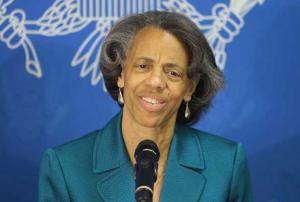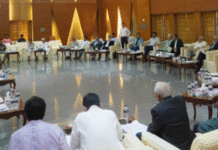“First of all, I would say, we don’t have a difference, because in fact terrorism, if you noticed, in each of these countries has been home grown. People who are committing the terrorism are not coming, like they used to, from outside these countries,” the US ambassador told reporters after a meeting with Dhaka South City Corporation (DSCC) mayor Syeed Khokon at the Nagar Bhaban in the capital.
Dwelling on the issue of how both the governments would work together when they have different views because US thinks Islamic States (IS) is responsible for the recent attacks while the Bangladesh does not subscribe to the IS claim.
“Every act of terrorism that has taken place in the United States as here by people who were born and raised in the United States or immigrated to the United States and lived there for a long time. The same is true here. People who appeared to have committed these terrorist acts are Bangladeshi,” said the ambassador.
“Does it mean that terrorism is rampant in our countries? No, what it means is that something is influencing them. People have told me about the attacks here that this is not Bangladesh. And, I believe that. I lived here now for over a year and a half and I understand this is not Bangladeshi culture, this is not Bangladeshi politics and this is not Bangladeshi religion especially not the way Islam is practiced here,” she added.
“But very few individuals and I emphasise that because terrorism does not need an army, terrorism works by individuals… two or three people together. Something or someone is influencing people here and elsewhere to commit the acts of terror they are committing,” Bernicat noted.
“So, I don’t think we have a difference in the way we view your government’s view of what’s happening here. I think our views are very similar,” she said, adding that it is being tried to figure out who is influencing especially the youths and the way of stopping them committing terrorism.
To a question, the ambassador said, “I was reacting to the stories I read in the press and comments you hear from time to time by your officials that doubt US sincerity in offering help and the point I was trying to make was that this [terrorism] is a global problem. And any country that stands apart and tries to work on the problem alone is going to have a very hard time in succeeding because the terrorists themselves enjoy a global network.”
She went on saying, “They are learning and adapting all the time as we have seen. It has been a particularly a violent summer around the world. So, we are stronger if we work together. The point I was trying to make is that, for those who criticise our efforts and think that we are trying to do something nefarious like occupy Bangladesh or destabilise Bangladesh, I just wanted to ensure everyone that we have actually the exact opposite goal in mind.”
“A strong, stable, prosperous Bangladesh is not only good for Bangladesh. It’s good for the world. Every country that is strong and stable and prosperous works better together,” she added.
“We know in the United States we can’t fight this fight by ourselves. And, same, we believe, true for every other country,” Bernicat said, adding, “We simply want to bring the knowhow and knowledge that we have. And, I also mentioned that Bangladesh especially after the attack on Holey [Holey Artisan Bakery] has become what I call part of the international crime scene.”
Clues from different countries can enable the world to push terrorism out from every country, she said.
She said that the mayor has been invited to join a network called Strong Cities Network which is a network of cities around the globe that are working together to address different issues including radicalisation with particular reference to youths.
Speaking on the occasion, mayor Khokon said that he does not think US development projects will be affected due to the present situation.
Source: Prothom Alo










